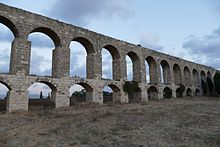Acre, Israel
Acre
| |
|---|---|
| Hebrew transcription(s) | |
| • ISO 259 | ʕakko |
 | |
 Municipal emblem | |
 Acre | |
| Coordinates: 32°55′40″N 35°04′54″E / 32.92778°N 35.08167°ECoordinates: 32°55′40″N 35°04′54″E / 32.92778°N 35.08167°E | |
| Grid position | 156/258 PAL |
| Country | |
| District | Northern |
| Founded | 3000 BC (Bronze Age settlement) 1550 BC (Canaanite settlement) 1104 (Crusader rule) 1291 (Mamluk rule) 1948 (Israeli city) |
| Government | |
| • Mayor | Shimon Lankri |
| Area | |
| • Total | 13,533 dunams (13.533 km2 or 5.225 sq mi) |
| Population (2019)[1] | |
| • Total | 49,380 |
| • Density | 3,600/km2 (9,500/sq mi) |
| Official name | Old City of Acre |
| Criteria | Cultural: ii, iii, v |
| Reference | 1042 |
| Inscription | 2001 (25th Session) |
| Area | 63.3 ha |
| Buffer zone | 22.99 ha |
Acre (/ˈɑːkər, ˈeɪkər/), known locally as Akko (Hebrew: עַכּוֹ, ʻAkkō) or Akka (Arabic: عكّا, ʻAkkā), is a city in the coastal plain region of the Northern District of Israel.
The city occupies an important location, sitting in a natural harbour at the extremity of Haifa Bay on the coast of the Mediterranean's Levantine Sea.[2] Aside from coastal trading, it was also an important waypoint on the region's coastal road and the road cutting inland along the Jezreel Valley. The first settlement during the Early Bronze Age was abandoned after a few centuries but a large town was established during the Middle Bronze Age.[3] Continuously inhabited since then, it is among the oldest continuously-inhabited settlements on Earth.[4] It has, however, been subject to conquest and destruction several times and survived as little more than a large village for centuries at a time. Acre was an important city during the Crusades, and was the site of several battles. It was the last city held by the Crusaders in the Levant before it was captured in 1291.
In present-day Israel, the population was 49,380 in 2019,[1] made up of Jews, Muslims, Christians, Druze, and Baháʼís.[5] In particular, Acre is the holiest city of the Baháʼí Faith in Israel and receives many pilgrims of that faith every year. Thirty-two per cent of the city's population is Arab. The mayor is Shimon Lankri, re-elected in 2018 with 85% of the vote.
Names


The etymology of the name is unknown, but apparently not Semitic.[6] A folk etymology in Hebrew is that, when the ocean was created, it expanded until it reached Acre and then stopped, giving the city its name (in Hebrew, ad koh means "up to here" and no further).[6]
Acre seems to be recorded in Egyptian hieroglyphs, possibly being the "Akka" in the execration texts from around 1800 BC[7][8] and the "Aak" in the tribute lists of Thutmose III (1479–1425 BC).[citation needed] The Akkadian cuneiform Amarna letters also mention an "Akka" in the mid-14th century BC.[9][10] On its native currency, Acre's name was written ʿK (Phoenician:


